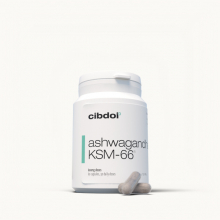Do you take ashwagandha at night or morning?
Last updated:
Published:
Do You Take Ashwagandha at Night or Morning?
Ever wondered when is the best time to take ashwagandha, a powerful adaptogen also known as Indian ginseng? Well, timing can play a crucial role in maximizing its benefits, especially for sleep quality. Ashwagandha, one of the most popular natural remedies, has gained popularity for its potential to enhance overall well-being. But should you consume it before bed or in the morning? Let's dive into this intriguing question.
Contents:
Taking ashwagandha, also known as Indian ginseng, at night might be advantageous for sleep quality. Many people swear by moon milk infused with this adaptogen as a soothing bedtime ritual to relieve stress. However, others argue that consuming ashwagandha during the day can help boost energy and focus. So which way is best?
Factors like personal routines and preferences, as well as the form of ashwagandha (tablet, capsule, or powder), can influence the dosage and timing of when to take this ayurvedic medicine. Considering whether to consume it on an empty stomach or with food may also impact its effectiveness as a supplement.
So if you're looking for ways to incorporate ashwagandha, an ayurvedic medicine, into your daily routine and reap its potential benefits for memory, sleep, and more, stay tuned! We'll explore the best time to take this ayurvedic supplement, ashwagandha, whether it's at night or in the morning. This information will help you decide when to take ashwagandha to maximize its benefits.
But first things first: let's uncover why timing is an important factor when harnessing the power of ashwagandha root. The time at which you take ashwagandha extract can greatly impact its effectiveness.

Timing Matters: Morning or Evening for Ashwagandha?
Discover why some people prefer taking ashwagandha in the morning.
For many individuals, starting their day off with a dose of ashwagandha powder has become a beneficial way to boost energy levels and enhance focus. Taking this herbal supplement in the morning may help increase alertness and mental clarity, allowing individuals to tackle their tasks with vigor throughout the day.
Moreover, taking ashwagandha supplement in the morning can help regulate cortisol levels over time. Cortisol is a hormone associated with stress response, and elevated levels of cortisol can lead to feelings of anxiety and fatigue. Research suggests that consuming ashwagandha supplement in the morning may help lower cortisol levels, promoting a sense of calmness and reducing stress throughout the day. This benefit is due to the impact of ashwagandha on cells.
Explore the potential benefits of consuming ashwagandha in the evening.
On the other hand, some people find that taking ashwagandha supplement in the evening better suits their lifestyle and preferences. One significant benefit of consuming this herb at night is its potential to improve sleep quality. Ashwagandha has been traditionally used as a supplement, which means it helps balance bodily functions. Consuming it before bed may promote relaxation and support a restful night's sleep.
Research suggests that ashwagandha, a natural supplement, may help optimize testosterone levels and provide benefits for muscle development and overall well-being. Taking ashwagandha in the evening could potentially improve muscle recovery and growth by supporting testosterone production during sleep hours. This could be particularly helpful for individuals looking to manage stress and enhance their fitness goals.
Consider how individual preferences and lifestyle factors can impact ashwagandha timing.
When deciding whether to take ashwagandha in the morning or evening, it's essential to consider personal preferences and lifestyle factors. Some people may find that taking this supplement in the morning aligns better with their routine, providing benefits such as an energy boost. Others might prefer consuming it in the evening, as it can help with sleep.
Moreover, individual responses to the stress supplement ashwagandha can vary. While some people may experience immediate effects, others might require several weeks of consistent use before noticing any changes. It's crucial to be patient and monitor how your body responds to the stress supplement ashwagandha at different times of the day.
Making an Informed Decision about Ashwagandha Timing
In conclusion, determining whether to take the ashwagandha supplement in the morning or evening depends on your personal preferences and desired outcomes. Here are some key points to consider when deciding on the timing of your ashwagandha supplement intake.
Ashwagandha can be taken in the morning to help boost energy levels and promote a sense of alertness throughout the day. It may provide a natural alternative to caffeine for those looking to start their day off on a positive note.
On the other hand, taking ashwagandha in the evening can support relaxation and stress relief, aiding in a restful night's sleep. This timing may be particularly beneficial for individuals seeking relief from anxiety or insomnia.
Ultimately, it is essential to listen to your body and observe how ashwagandha affects you personally. Some individuals may find that taking it at different times of the day yields varying results. Experimentation can help determine what works best for you.
To make an informed decision about ashwagandha timing, consider factors such as your lifestyle, goals, and any specific health concerns you may have. Consulting with a healthcare professional or herbalist can also provide valuable insights tailored to your individual needs.
Remember that while ashwagandha has been used for centuries in traditional medicine, scientific research is still ongoing regarding its efficacy and potential side effects. Therefore, always ensure you purchase high-quality products from reputable sources.
Incorporating ashwagandha into your daily routine can offer potential benefits for overall well-being. Whether you choose morning or evening consumption, consistency is key. Give yourself time to assess its impact on your body before making any adjustments.
FAQs
Can I take ashwagandha with food?
Yes, it is generally recommended to take ashwagandha with food as it helps with absorption and reduces the risk of gastrointestinal discomfort.
How long does it take for ashwagandha to show results?
The effects of ashwagandha can vary from person to person. Some individuals may experience noticeable benefits within a few weeks, while others may require more time. Consistency in usage is crucial.
Can I take ashwagandha if I am pregnant or breastfeeding?
It is advisable to consult with your healthcare provider before taking any supplements, including ashwagandha, during pregnancy or while breastfeeding.
Are there any side effects associated with ashwagandha?
Ashwagandha is generally well-tolerated by most individuals when taken within recommended doses. However, some people may experience mild side effects such as stomach upset or drowsiness. If you have any concerns, it is best to consult a healthcare professional.
Can I combine ashwagandha with other medications or supplements?
If you are currently taking any medications or other herbal supplements, it is important to speak with your healthcare provider before adding ashwagandha to your routine. They can provide guidance on potential interactions and ensure your safety.
Remember that these FAQs serve as general information and should not replace personalized advice from a healthcare professional. Additionally, when considering the use of ashwagandha extract or organic ashwagandha powder, it is important to consult with a healthcare professional for personalized guidance.











